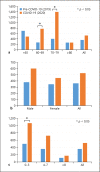Changes in Stroke Patients' Health-Seeking Behavior by COVID-19 Epidemic Regions: Data from the Korean Stroke Registry
- PMID: 34592732
- PMCID: PMC8678250
- DOI: 10.1159/000519093
Changes in Stroke Patients' Health-Seeking Behavior by COVID-19 Epidemic Regions: Data from the Korean Stroke Registry
Abstract
Introduction: The coronavirus disease 2019 (COVID-19) pandemic has led to changes in stroke patients' healthcare use. This study evaluated changes in Korean stroke patients' health-seeking behaviors and stroke care services using data from the Korean Stroke Registry (KSR).
Methods: We reviewed data from patients with acute stroke and transient ischemic attack (TIA) during 2019 (before COVID-19 period) and 2020 (COVID-19 period). Outcomes included patient characteristics, time from stroke onset to hospital arrival, and in-hospital stroke pathways. Subgroup analyses were performed for an epidemic region (Daegu city and Gyeongsangbuk-do region, the D-G region).
Results: The study included 1,792 patients from the pre-COVID-19 period and 1,555 patients from the COVID-19 period who visited hospitals that contribute to the KSR. During the COVID-19 period, the D-G region had two-thirds the number of cases (vs. the pre-CO-VID-19 period) and a significant decrease in the proportion of patients with TIA (9.97%-2.91%). Unlike other regions, the median onset-to-door time increased significantly in the D-G region (361 min vs. 526.5 min, p = 0.016), and longer onset-to-door times were common for patients with mild symptoms and who were in their 60s or 70s. The number of patients who underwent intravenous thrombolysis also decreased during the COVID-19 period, although the treatment times were not significantly different between the 2 periods.
Discussion/conclusion: Korean stroke patients in a CO-VID-19 epidemic region exhibited distinct changes in health-seeking behaviors. Appropriate triage system and public education regarding the importance of early treatment are needed during the COVID-19 pandemic.
Keywords: Coronavirus disease 2019; Health-seeking behavior; Stroke; Stroke registry; Transient ischemic attack.
© 2021 The Author(s) Published by S. Karger AG, Basel.
Conflict of interest statement
The authors have no conflicts of interest to declare.
Figures



References
-
- Munster VJ, Koopmans M, van Doremalen N, van Riel D, de Wit E. A novel coronavirus emerging in China: key questions for impact assessment. N Engl J Med. 2020 Feb 20;382((8)):692–4. - PubMed
Publication types
MeSH terms
LinkOut - more resources
Full Text Sources
Other Literature Sources
Medical

